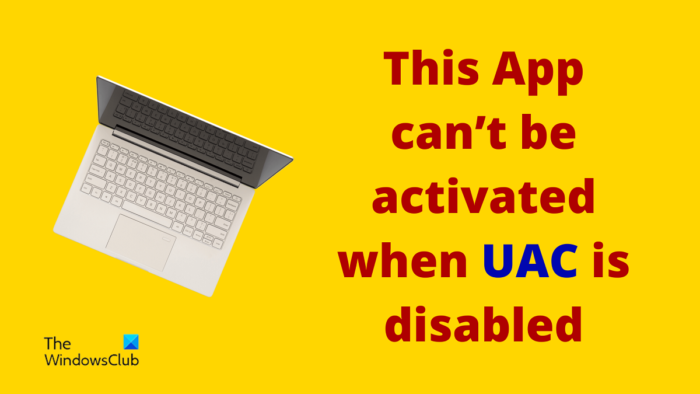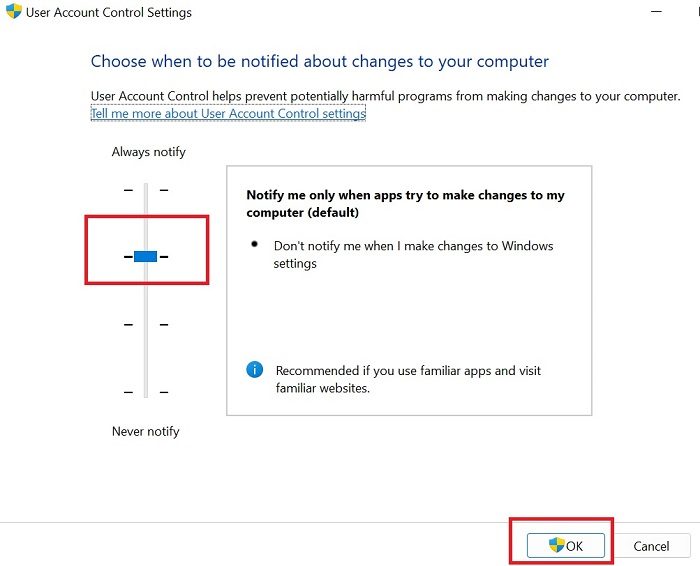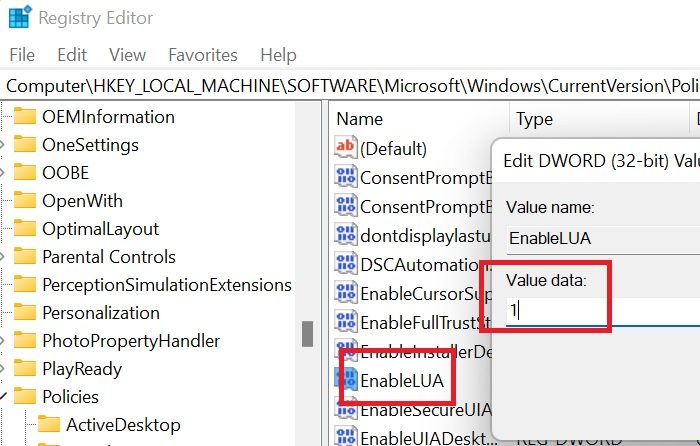Microsoft introduced an excellent access control feature for its versions of the Windows operating system named User Account Control (UAC). If UAC is disabled, you might not be able to use many programs and websites. Thus, you might encounter the error This App can’t be activated when UAC is disabled while trying to launch an application.

This App can’t be activated when UAC is disabled
You would encounter this error message when trying to launch some programs. The causes include UAC being temporarily or permanently disabled. Also, pending updates could cause a problem in the discussion. To resolve the situation, try the following solutions sequentially:
- Re-enable User Account Control (UAC)
- Registry Level fix
- Group Policy Editor fix
- Update Windows
1] Re-enable User Account Control (UAC)

The User Account Control system is necessary as a security measure for your Windows system. It is enabled by default. The service can be disabled either by changing the settings on your system or if a third-party software does the same. The best solution to the problem in discussion is to re-enable UAC. The procedure is as follows:
- Search for User account control in the Windows Search bar.
- Select the option for Change User Account Control settings.
- If the UAC is OFF, then the slider will be at the bottom-most level.
- Lift the slider by one level and click on OK to save the settings.
Check if it resolves the problem. If not, list it on another level.
2] Registry Level fix

Press Win+R to open the Run window and type the command REGEDIT. Hit Enter to open the Registry Editor window.
In the Register Level window, go to the following path:
HKEY_LOCAL_MACHINE\SOFTWARE\Microsoft\Windows\CurrentVersion\Policies\System
In the right pane, double-click on the entry EnableLUA to open its properties.
Change the value of the Value Data to 1.
Click on OK to save the settings.
Reboot your system and if the issue persists.
3] Group Policy Editor fix
For company-managed systems, you can consider using the Group Policy Editor fix. However, this fix must be used by the system administrator on the server computer. The procedure is as follows:
- Press Win+R to open the Run window. In the Run window, type the command gpedit.msc and hit Enter to open the Group Policy Editor window.
- In the Group Policy Editor window, go to the Windows Settings > Security Settings > Local Policies > Security Options.
- Double-click on User Account Control: Admin Approval Mode for the Built-in Administrator account
- Select the box next to Enabled.
- Now, double-click on User Account Control: Behavior of the elevation prompt for administrators in Admin Approval Mode and change it to Prompt for Credentials from the drop-down menu.
4] Update Windows
Pending Updates can also cause this issue to raise its head. So it is highly advisable to update Windows to the latest version.
By updating Windows, you will make sure that any bug causing the problem will be resolved if Windows pushes the fix. It will also ensure that security updates are pushed to your system and that the security issues are not a cause for the problem.
Similar: This app can’t open while User Account Control is turned off
Is it OK to disable User Account Control?
Due to security concerns, it is advisable not to disable UAC on your system. Sometimes users disable it to allow certain features on games and programs. If you did it for the same reason, make sure to reactivate UAC later. Other than this, some third-party software products also disable UAC for their smooth running. You can enable it as explained in this article.
Should UAC be ON or OFF?
A better question would be at what level should UAC be? Should it be at level 2 or level 4? Some apps could be restricted by User Account Control. While UAC should always be ON, if it is restricting the functioning of some applications, then you can lower its level. I would personally suggest keeping it at the Recommended level 2 for your convenience.
What triggers a UAC warning?
A UAC warning is triggered when a desktop application required administrator privileges. When at level 2, you will get notifies when a third-party application tries to push changes to the settings of your system. Level 3 is the same as level 2, except that it dims the laptop as a symbol. Level 4 is extremely strict and the user needs permission for everything. I suggest keeping it at level 2.